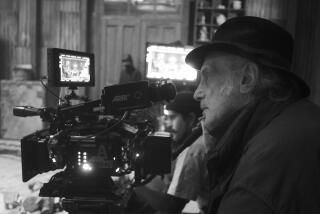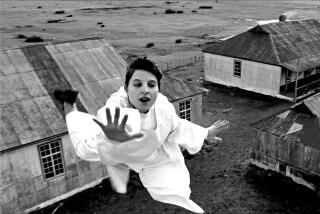Movie review: ‘Into The Abyss’
Werner Herzog’s understated new documentary, “Into the Abyss: A Tale of Death, a Tale of Life,” is at its core the filmmaker’s personal argument against capital punishment. The director, who came of age in post-World War II Germany with its concentration camp legacy, makes it clear where he stands on the issue — the taking of another life, whether legally sanctioned or not, is wrong.
Though that is the starting point, Herzog is neither an apologist for the criminal’s deeds nor strident in his debate. It is familiar ground Herzog is covering, with its fundamental “Dead Man Walking” crisis of conscience issues. What is missing is something new — clarity, insight, outrage. Instead, its understatement is ultimately its undoing.
As a reminder or a reflection, though, the film has some power. After sorting through countless death row cases, the director chose to focus on that of Michael Perry, a small-town Texas teenager convicted of a homicide in 2001 and executed just days after his only interview with the filmmaker in summer 2010. What began as a simple crime — a red Camaro convertible that Perry and another teen, Jason Burkett, set out to steal — turned into a complex chain of events that resulted first in the death of 50-year-old Sandra Stotler, and later the killing of Stotler’s 16-year-old son, Adam, and his 18-year-old friend Jeremy Richardson. Sandra’s body was dumped in a local lake; Adam and Jeremy were shot in a heavily wooded area as they tried to run away.
Perry received the death penalty for Sandra’s murder; Burkett was sentenced to life is prison for his role in the crimes.
As capital cases go, Perry’s was a relatively clear one. The teenagers were arrested about a week after Sandra’s death in a shoot-out with police. At the time, they were in the car of one of the victims, along with the gun that killed Sandra. Initially, detectives thought they were dealing only with Sandra’s murder, until Perry, in a confession he would later recant, told police where they could find the bodies of Adam and Jeremy.
The director structures the film around the people who become a part of the execution process on Texas’ very active death row: the detectives, the captain who straps the convicted onto the gurney and the chaplain who stays with the prisoner until the end. And most painfully, the emotionally wounded families of the victims who come to bear witness alongside the battered families of those on death row. There are no winners here.
Before Herzog digs into the specifics of Perry’s case, he begins with a slow pan of the final holding cell, the various Bibles within reach, the death chamber itself. The Rev. Richard Lopez, a death row chaplain, leads us through those final hours from his point of view — what it is like for the prisoner, what it is like for him, how he sees God’s hand in all of this. Then we meet Perry. At 27, he still looks like a teenager, not a monster responsible for the deaths of three people.
Making liberal use of the crime scene video, Herzog does not shy away from the horror of the crime. Graphic images of the streaks and splatters of blood found in Sandra’s Conroe, Texas, home, are unsettling yet not unexpected. It is the details of her everyday existence that prove to be among the film’s most poignant moments — the cookies she’d made that night still waiting to be slipped into the oven, the TV she had on playing in the background.
Even with those personal touches, the film never achieves the grace of Herzog’s 2010’s “Cave of Forgotten Dreams” nor the narrative strength of 2005’s “Grizzly Man.” “Abyss” is at its weakest when Herzog is interviewing the families of the crime victims — the daughter and sister the Stotlers left behind, Richardson’s older brother — looking stagy as they hold framed photos of their dead. More compelling is the captain, who spent years working on death row; the chaplain shaken by the deaths but committed to his duty. It’s mostly somber stuff, but there are a few moments of much needed comic relief, a turn of phrase here, a random observation there.
The argument for a life sentence as punishment enough comes primarily in prison house conversations with Burkett and Perry, both talking of that endless stretch of time they mark off. For Perry, it was just days; for Burkett, it’s 40 more years before his first parole hearing.
Most eloquent is Delbert Burkett, Jason’s father. Like his son, he is serving life for a murder and his plain-spoken lament — for all who died, criminal and victim alike, for the mistakes of his life, for the ways he failed his son — becomes the film’s strongest voice. It is the kind of heartfelt emotion that “Into the Abyss” needs more of.
More to Read
The biggest entertainment stories
Get our big stories about Hollywood, film, television, music, arts, culture and more right in your inbox as soon as they publish.
You may occasionally receive promotional content from the Los Angeles Times.







